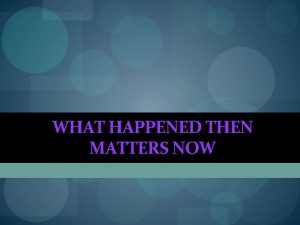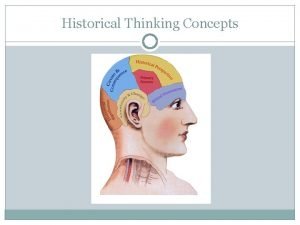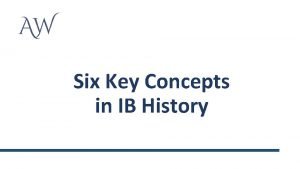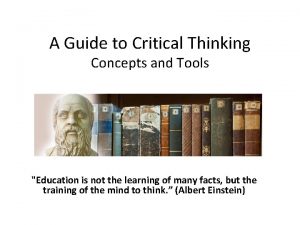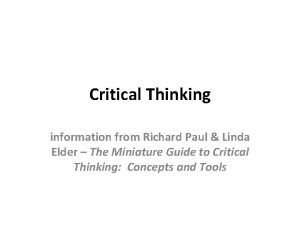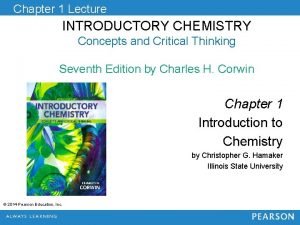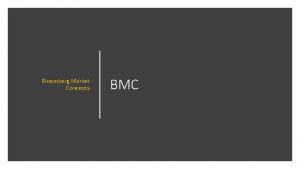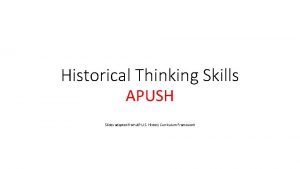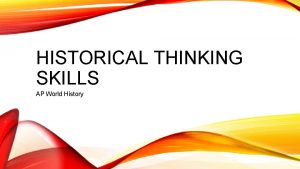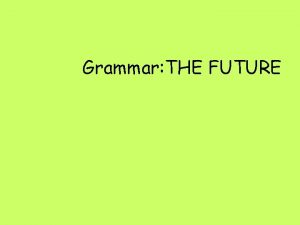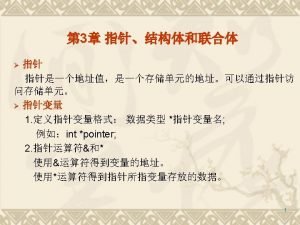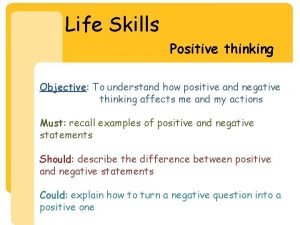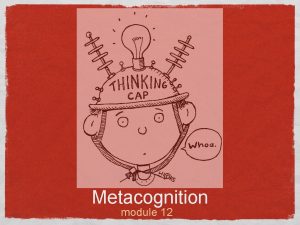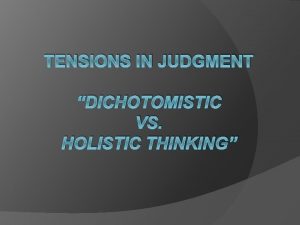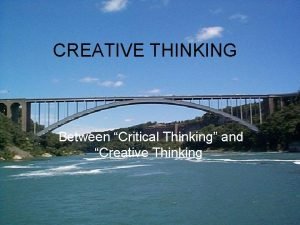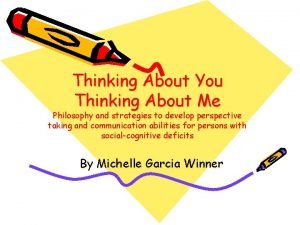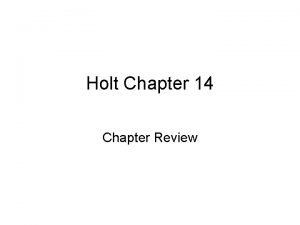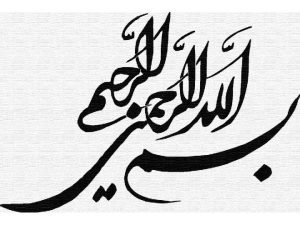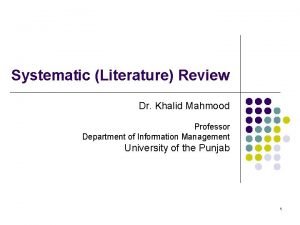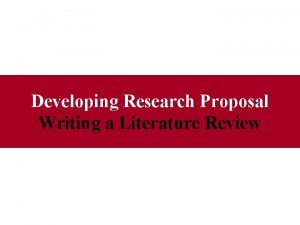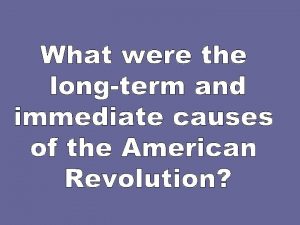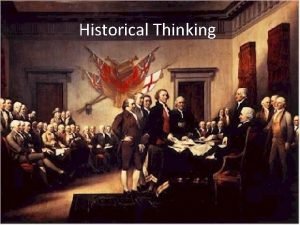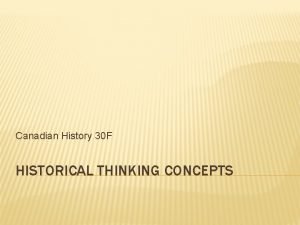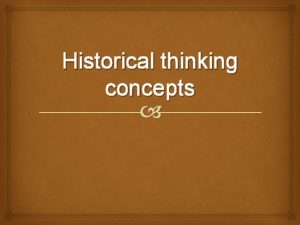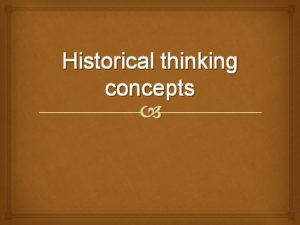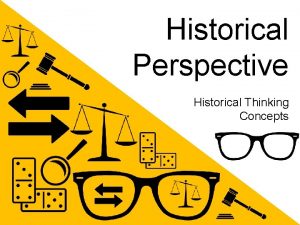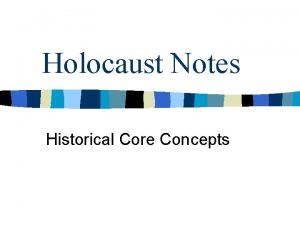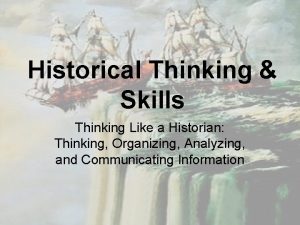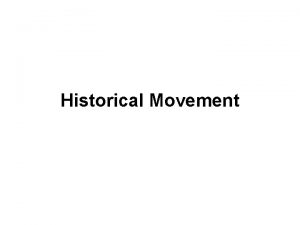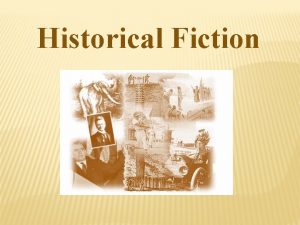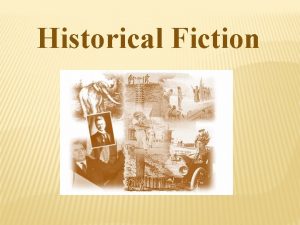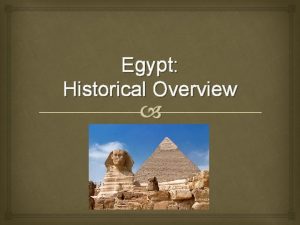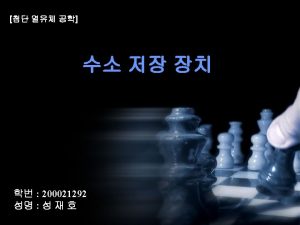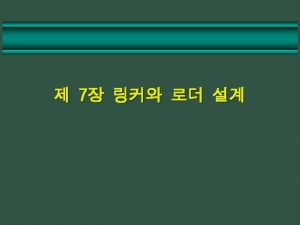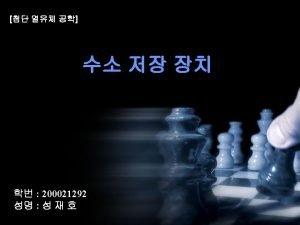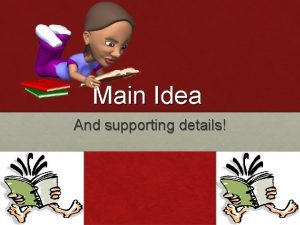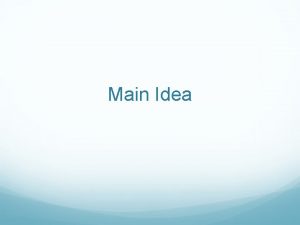Historical Thinking Review of Main Historical Thinking Concepts
























- Slides: 24

Historical Thinking Review of Main Historical Thinking Concepts

What is ‘Historical Thinking? ’ � Historical Thinking is the process that historians go through to interpret the evidence of the past and generate the stories of history. � The Question: How can we use the evidence history has provided us to tell stories of the past and form opinions of the past when different cultures have various ways of understanding the past, present, and future?

The Goal of Historical Thinking �The goal of historical thinking is to see past the one perspective a historian presents. Think of a historian like a director of a play, and you are the audience. What I want is for you to look backstage and find out how different elements work together to create and make the play possible.

The Big Six Historical Thinking Methods �Historical Significance �Primary Source Evidence �Continuity and Change �Cause and Consequence �Historical Perspectives �Ethical Judgments

Historical Significance �Helps us answer: How do we decide what is important to learn about the past? �Particular events become significant when we see them as part o a larger narrative that is relevant to issues that concern us today. �But how do we know if something is significant?

Criteria for Historical Significance �Did it result in change? � Events, people, or developments have historical significance is they resulted in change. This change would have deep consequences (or benefits) for many people, over a long period of time. �Is it Revealing? � Events, people or developments have historical significance if they are revealing. That is, they shed lights on enduring or emerging issues in history or contemporary life.

Criteria for Historical Significance �Historical significance is constructed. � A meaningful narrative has been built by historians that allow the first two criteria to be evaluated. � The historian typically addresses a big question, describes the events and identifies the roles of particular events, people or developments. � Example: Was John A. Mac. Donald a hero or a villain to Canada? �Historical significance can vary over time and from group to group. � Can you think of an example of how this may vary?

Criteria for Historical Significance �For example, the story of an individual worker in Winnipeg in 1918, however insignificant in the post. World War II sense, may become significant if it is recounted in a way that makes it a part of a larger history of workers’ struggles, economic development, or post-war adjustment and discontent.

Primary Source Evidence �Helps us answer: How do we know what we know about the past? �Primary sources give us a window into the past; they allow us to see history from multiple perspectives that help us shape our understanding. �We must ask good questions as we investigate primary sources so that we can turn it into evidence.

How to work with Evidence � We must make interpretations based on inferences made from primary sources. � These may be first hand accounts, relics, records, photographs, art, newspaper articles, etc. � Asking good questions can turn a source into evidence. � Sourcing begins before the source is actually read. � This is done by asking questions like “who created it, ” “when was it created, ” “what were the creator’s purposes, values and worldviews? ” � A source should be analyzed in relation the context of its historical setting (ex: worldviews and conditions relevant at the time)


Continuity and Change �Helps us answer: How can we make sense of the complex flows of history? �Dates in history are not everything, however they are important to help us understand which events are prior, subsequent or simultaneous. �By understanding when things take place, we can better see the relationship between continuity and change.

Continuity and Change �We need to see historical events as interrelated (continuous), and not isolated events. Guideposts for understanding Continuity and Change: �Continuity and change are interwoven; both can exist together. Chronology is a good starting point. �Change is a process with varying paces and patterns. � Turning points are moments when the process of change shifts in direction or pace

Continuity and Change � Progress and Decline � These are broad evaluations overt time. Depending on the change it may be progress for some, but decline for others. � Example: defeat of one political party by another in an election. � Periodization helps us organize our thinking about continuity and change. � It is a process of interpretation by which we decide which events or developments creates a period of history.

Cause and Consequence �Helps us answer: Why do events happen, and what are their impacts? �In examining both tragedies and accomplishments of the past, we normally ask, “how” and “why? ” �These questions lead us into a search for the causes: what were the actions, beliefs and circumstances that led to these consequences?

Cause and Consequence �People are often the cause of historical change in social, political, economical and technological events. Actions often have unintended consequences.

Guideposts to Cause and Consequence � Change is driven by multiple causes and results in multiple consequences. These create a web of interrelated shortterm and long-term consequences. � The causes that lead to a particular historical event vary in their influence, with some being more important than others. � Events often result from the interplay of factors: historical actors (individuals or groups who take actions that cause historical events, and the social, political, economic and cultural conditions within which the actors operate

Guideposts to Cause and Consequence �Historical actors cannot always predict the effect of conditions, opposing actions and unforeseen reactions. These are unintended consequences. �The events of history are not inevitable any more than those of the future are. When you alter a single action or condition an event may have turned out differently.

Historical Perspective �Asks us to not judge the past by today’s standards so that we can better understand the different social, cultural, intellectual, and even emotional contexts that have shaped people’s lives and actions in the past. �“The past is a foreign country, they do things differently there. ” ~ David Lowenthal, 1985 �In other words, the past is different thus at times difficult to understand.

Historical Perspective �Taking a historical perspective means understanding the social, cultural, intellectual, and emotional settings that shaped peoples lives and actions in the past. �It is important to avoid presentism = the unwarranted imposition of present ideas on those in the past.

Guideposts to Cause and Consequence � An ocean of difference can lie between current worldviews and those of an earlier period. � The perspective of those in the past are best understood by considering their historical context. � Taking historical perspective means inferring how people felt and thought in the past. It doesn’t mean identifying with those in the past. Valid inferences are based on evidence. � Different historical people have diverse perspectives on events that they were involved in. Exploring these is key to understanding the past.

Ethical Judgment �Helps us answer: How can history help us to live in the present? �Involves making ethical conclusion about historical actions and people, and assigning ethical responsibility to historical figures or contemporary individuals and groups for past actions.

Ethical Judgment � Are we obligated to remember the fallen soldiers of World War I? � Do we owe reparations to the Aboriginal victims of residential schools, or to the descendents of those who paid the Chinese Head Tax? � In other words, what responsibilities do historical crimes and sacrifices impose upon us today? � Taking historical perspective demands that we understand the differences between our ethical universe and those of bygone societies. � At the same time, we do not treat those like brutal slave- holders, and enthusiastic Nazis in a ‘neutral’ manner.

Ethical Judgment � A fair assessment of the ethical implications of history can inform us of our responsibilities to remember and respond to the contributions, sacrifices, and injustices of the past. � Our understanding of history can help us make informed judgments about contemporary issues, but only when we recognize the limitations of an direct “lessons” from the past. � Written response: based on what you have learned from the timeline, explain how the Holocaust happened.
 Historical thinking concepts meaning
Historical thinking concepts meaning Historical thinking concepts
Historical thinking concepts Ib historical concepts
Ib historical concepts Victorian curriculum history
Victorian curriculum history Critical thinking concepts
Critical thinking concepts Linda elder critical thinking
Linda elder critical thinking Introductory chemistry concepts and critical thinking
Introductory chemistry concepts and critical thinking Ssef price list
Ssef price list Break the wall
Break the wall The historical skill of corroboration involves
The historical skill of corroboration involves Historical thinking skills ap world history
Historical thinking skills ap world history Future with will form
Future with will form Main ideas examples
Main ideas examples Void main int main
Void main int main Positive thinking vs negative thinking examples
Positive thinking vs negative thinking examples Thinking about your own thinking
Thinking about your own thinking Holistic judgement
Holistic judgement Perbedaan critical thinking dan creative thinking
Perbedaan critical thinking dan creative thinking Thinking about you thinking about me
Thinking about you thinking about me Chapter review motion part a vocabulary review answer key
Chapter review motion part a vocabulary review answer key Ap gov final review
Ap gov final review Narrative review vs systematic review
Narrative review vs systematic review Example of inclusion and exclusion criteria
Example of inclusion and exclusion criteria Narrative review vs systematic review
Narrative review vs systematic review Data management concepts
Data management concepts
